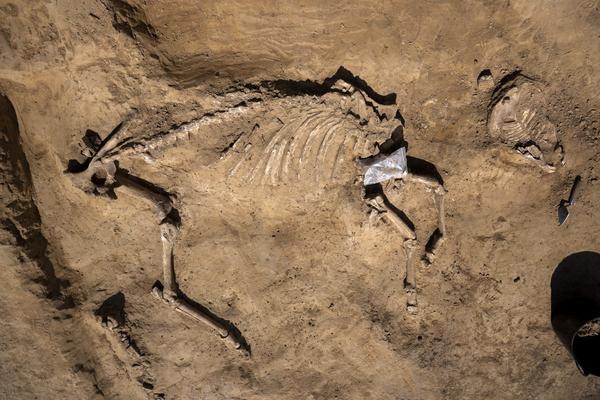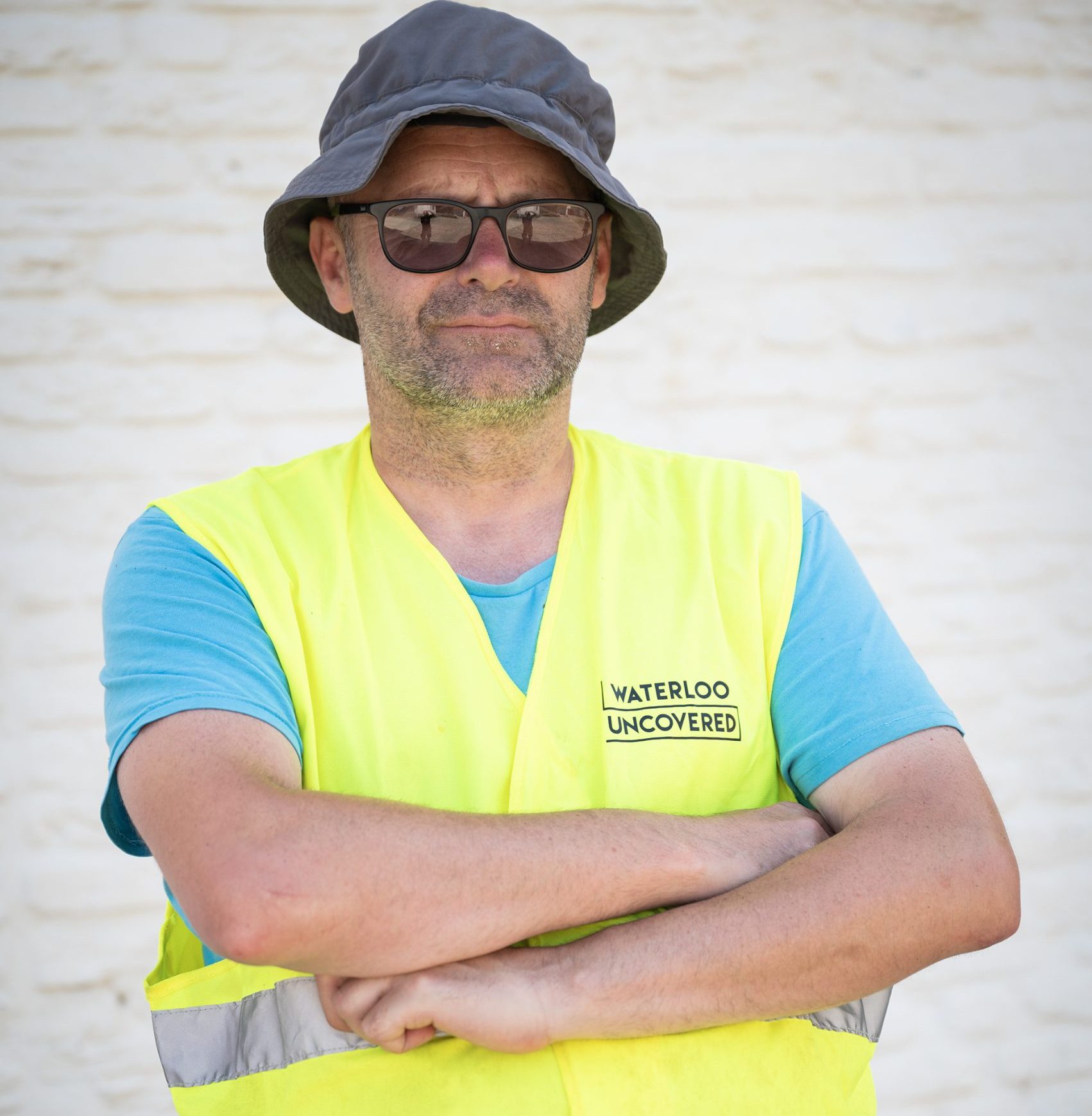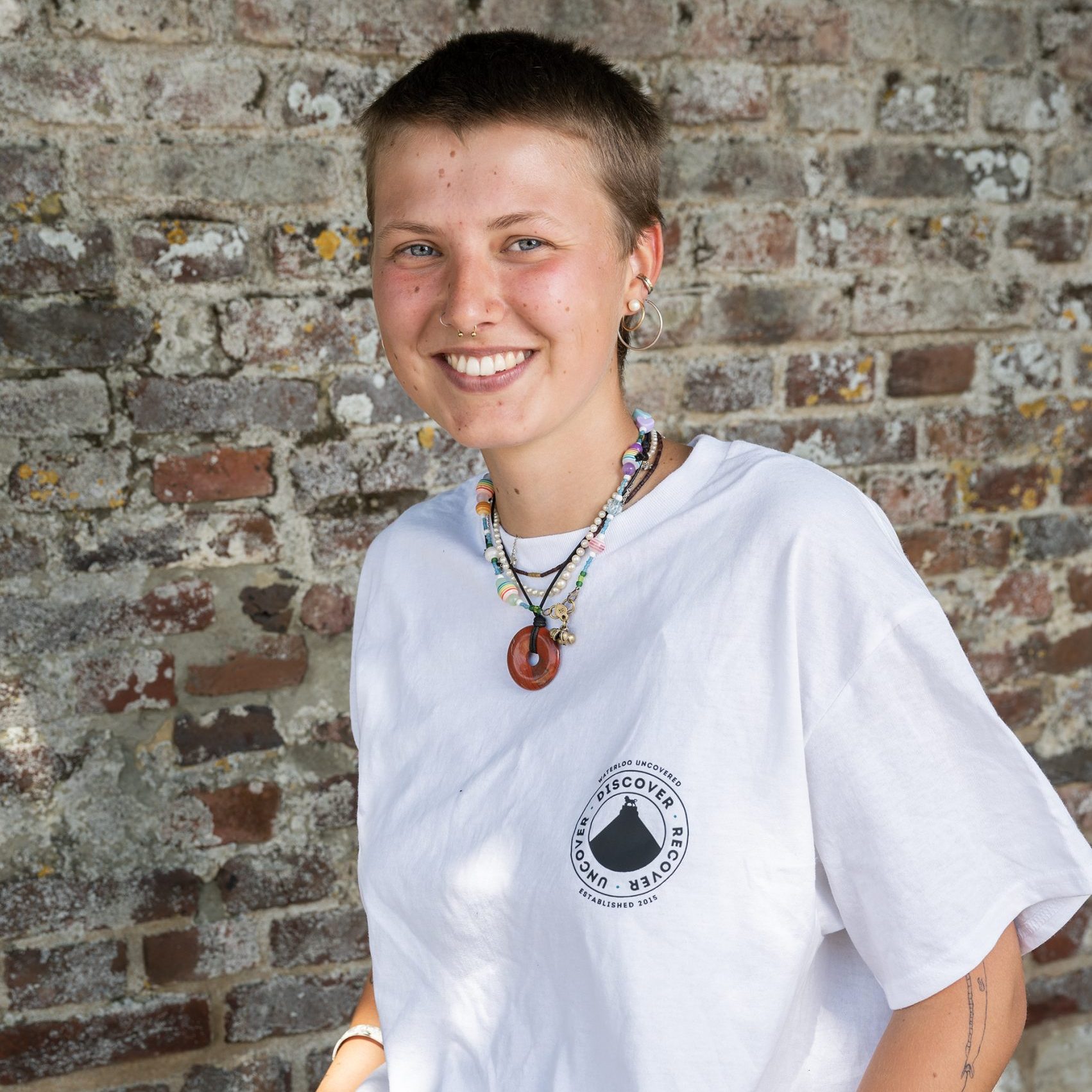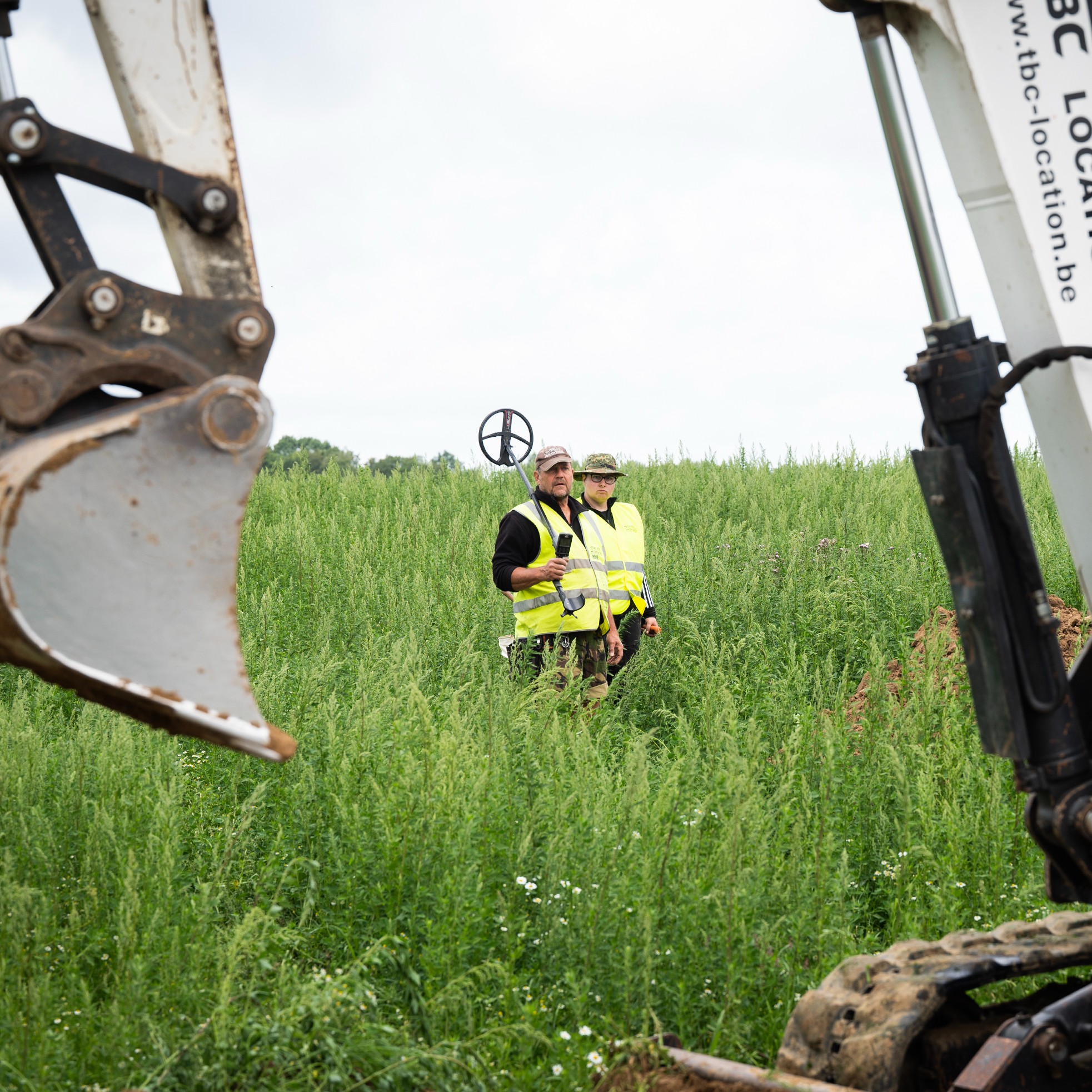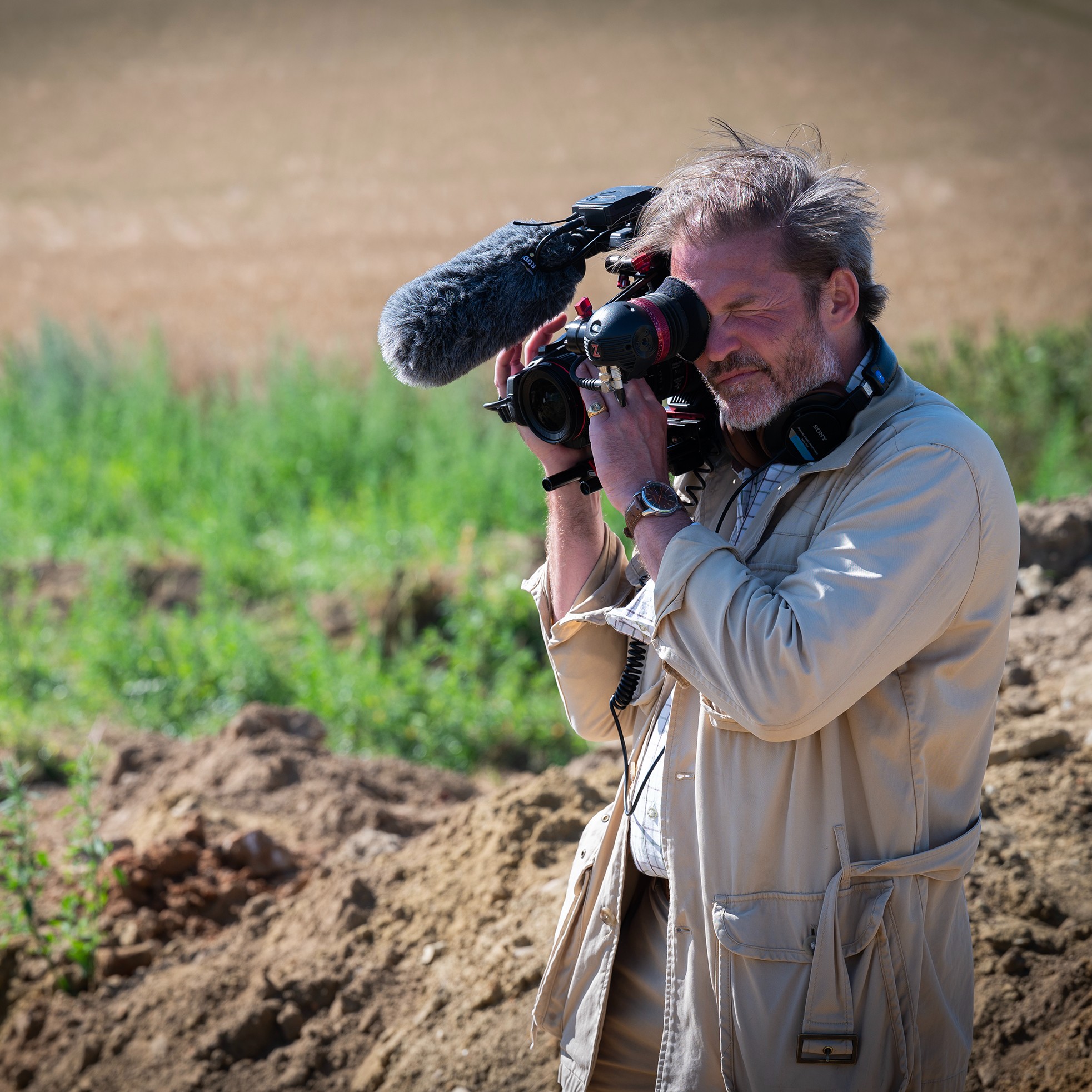Welcome to the latest edition of Waterloo Uncovered’s Dig Diary.
By Hattie Ford
In this edition:
- An important announcement about our Coronavirus response;
- An exciting television appearance;
- Learn how geophysical survey will shape the future of WU;
- Some isolation inspiration for you – including how you can help Waterloo Uncovered!
2020 Summer Excavation Cancelled
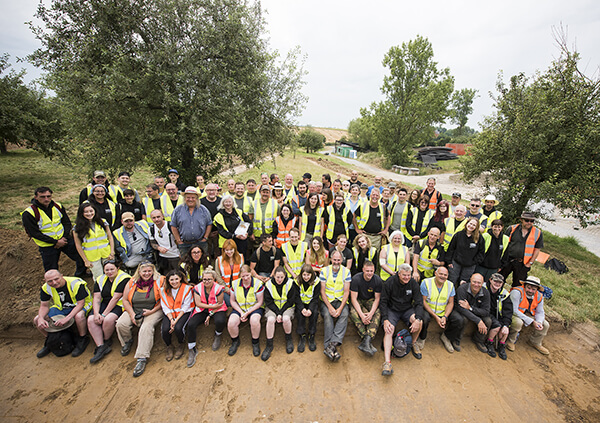
It was with a heavy heart that we announced last week the postponement of our 2020 Summer Excavation until 2021. Due to the COVID-19 outbreak, we felt that it was inadvisable to travel to Belgium in a few short months, with a contingent of veterans and serving personnel, some of whom may be vulnerable. This was not an easy decision to make but we hope that everyone will understand why it was necessary in the current circumstances. Our priority is always the safety and wellbeing of our participants, and postponing the dig until next year seems the best way to ensure this. To read a statement from WU co-founder and CEO Mark Evans about the postponement, please click here: https://www.waterloouncovered.com/an-important-update-2/
But this doesn’t mean that Waterloo Uncovered will be dormant for a year. To replace the dig, we are in the process of developing an exciting virtual programme of online lectures, videos, articles and activities. These will be made available to our participants, our supporters and to wider audiences via this website -so watch this space! Over the next few months, we’ll be bringing you online talks with experts such as our Archaeological Director Professor Tony Pollard, a run-down of the most up to date archaeological technology including geophysical survey and virtual reality, alongside a series of short films to help you learn more about our work and discoveries in Belgium. We’re also bringing you all the details on our most exciting finds, expert knowledge on a wide variety of Waterloo topics in a series of articles, and wisdom straight from the mouth of Time Team’s Phil Harding. Stay tuned for more information as we develop this ambitious programme, and to ensure you get the latest updates, sign up for our newsletter below: https://www.waterloouncovered.com/contact-us-2/newsletter-2/
Veterans Step Up To Volunteer
In these unprecedented times, we are all immensely grateful for the work of NHS staff and other key workers who are on the front lines. It has also been heartening to see the general public step up to help in any way they can. In March, an NHS appeal managed to recruit an amazing 750,000 volunteers in less than a week, and people all around the country are raising money for the NHS and other important causes. Most recently, 100 year old veteran Captain Tom Moore broke JustGiving’s record for the most successful fundraiser ever, having raised an incredible £29 million at the time of writing for the NHS.

Many of the veterans and staff associated with Waterloo Uncovered have also stepped up to help as best they can. One of these is David Ulke, a former RAF Nursing Officer and part of Waterloo Uncovered’s Welfare Team. David answered the NHS’s call for volunteers and has since been delivering prescriptions, shopping and vital supplies to vulnerable people and hospitals in his local area. He is also working with his Village Volunteer Hub, coordinated by Debbie, the landlady of the Woolpack pub in Weston. The Hub was set up before the NHS’s plea for volunteers, and focuses on helping the elderly and most vulnerable in their village. David, who has spent his adult life in the service of his country through his work with the NHS and the RAF, describes stepping up to help as “like second nature” to him.
Many of us are incredibly lucky to have a number of privileges during this crisis: stable physical and mental health, secure financial situations, access to green spaces, the ability to work from home and the support of a family or partner. However, many people have found themselves alone, unsupported, unemployed and vulnerable in these difficult times. David believes that right now, those of us who have found ourselves lucky should think about those who don’t have the same privileges:
“It is on those of us who do and can do to step up and make the effort”.
David Ulke, WU Welfare Officer
We encourage everyone to look out for each other and reach out to the most vulnerable in their communities while remaining safe, protecting themselves and adhering to social distancing. We’ll be bringing you more news about how members of the Waterloo Uncovered “family” having been volunteering their skills and effort, in the weeks to come.
Take the 2.6 Challenge for Waterloo Uncovered.
In light of Coronavirus, charities in the UK are struggling more than ever, with many fighting to stay afloat and having to cut or adapt essential services and staff. Due to the necessity of lockdown, we have lost the ability to hold events and fundraisers, a vital part of the charity sector’s survival. One of the events that had to be cancelled was the world’s biggest fundraising event: the London Marathon, which raised £66.4 million for thousands of charities last year, and was this year cancelled for the first time in its history. Without the money raised by the London Marathon and other fundraising events, some of the UK’s charities are at serious risk of collapse – putting the vulnerable people and services that rely on them at risk, too.
In response, the fantastic 2.6 Challenge was created to support the UK’s charities. Instead of running the 26 miles of the London Marathon, participants can do 2.6, 26 or 260 of any activity they choose, to raise money for their favourite charity! To take part, simply pick an activity that you can challenge yourself to; for example, you could decide to run 2.6 miles a day, or stay in fancy dress for 26 hours. Then, choose a charity that you would like to support – we hope you will choose Waterloo Uncovered! – and make a donation, or set up a JustGiving page and ask your friends and family to sponsor you. Make your chosen challenge known on social media using the #TwoPointSixChallenge hashtag and encourage your friends to donate, or start a challenge of their own. For more information about the Challenge and how to get involved, see their website: https://www.twopointsixchallenge.co.uk/
We will be launching this exciting challenge on the 5th of May, also known as #GivingTuesday, so start thinking about what you can do if you’d like to take part and support WU. The possibilities are endless, and you have until the 18th of June to get involved! You could do 2.6 laps of your garden in roller-skates, try your hand at 260 push ups, or put on your favourite songs and dance for 26 minutes straight. If you’re not the sporty type, don’t worry, there are plenty of different ways to get involved – just use your imagination! For example, you could bake 26 cookies, paint a picture in 26 minutes, or help your children build a 2.6 metre high Lego tower – anything you can think of to raise money. If you’re a little stuck for ideas, try heading to twitter and looking through the #TwoPointSixChallenge hashtag for inspiration.

From the 5th of May, Waterloo Uncovered’s Senior Fundraising Officer Kate Scott will be cycling an incredible 26 miles a day for 26 days to do her part for Waterloo Uncovered. Clive Jones, long-time friend of Waterloo Uncovered and head of the Coldstream Guards 1815 re-enactment group will also be undertaking a challenge in his period accurate Coldstream Guards uniform! Watch this space for more details and for the official launch of Waterloo Uncovered’s 2.6 Challenge next Tuesday.
Gyles Brandreth on Pointless for WU

On the 25th of April, viewers who tuned into Pointless Celebrities on BBC One would have been greeted by Gyles Brandreth – playing for Waterloo Uncovered! We were pleased to hear a big round of applause from the crowd when Gyles explained the important work that we do in supporting veteran welfare and recovery, and we thank Gyles for raising awareness of Waterloo Uncovered. Gyles has been a stalwart supporter of our work for some time. In November he hosted our successful Fundraising event “A Night To Remember” at the Middle Temple Hall in London, which helped raise over £100,000. We’ll be bringing you details of this year’s Fundraiser, and inviting people to “save the date’ in the next edition of the Dig Diary.
Gyles’ Pointless partner, RuPaul’s Drag Race UK contestant Baga Chipz, was playing for the charity Age UK, who support elderly people across the country. The pair made it to the final and won the coveted Pointless trophy, but unfortunately just missed out on the Pointless jackpot. However, the pair were still given an amazing £500 each towards their chosen charities for taking part! We appreciate Gyles and Baga for giving it a go, and wish them better luck next time. If you missed the episode, you can still catch it on iPlayer now: https://www.bbc.co.uk/iplayer/episode/m000hr8r/pointless-celebrities-series-13-england
Geophysics and Waterloo: An Exciting PhD Opportunity
Waterloo Uncovered is planning to get even closer to the hidden story of Waterloo thanks to the first ever systematic geophysical survey of the whole battlefield, made possible by a collaboration with academic partners at Bournemouth University and Ghent University. With the support of these institutions, from landowners around Waterloo, and from our local Belgian archaeology partners in AwAP (Agence wallonne du Patrimoine/Walloon Heritage Agency), we will soon be welcoming a new team member, in the form of a PhD candidate specialising in geophysical survey! The successful PhD candidate will undertake an ambitious project entitled ‘Waterloo Uncovered: Using Large-Scale Geophysical Survey to Investigate the World’s Most Famous Battlefield’. This may sound technical, but it’s going to reveal secrets long-hidden under the ground. The student, under the tutelage of expert battlefield archaeologists and geophysicists, will carry out research that will guide the next five to ten years of Waterloo Uncovered’s excavation at the site of the Battle of Waterloo.

Our partners have got form in this area: Ghent University’s ORBit research group became famous for their role in the pioneering Stonehenge Hidden Landscape Project, which revealed a huge amount of new information about one of the UK’s best-known archaeological sites. Ghent began working with Waterloo Uncovered in 2015, when a team lead by Philippe de Smedt surveyed areas around Hougoumont and La Haye Sainte using Electromagnetic Induction (EMI) and Magnetic Gradiometry (MG). The survey proved its value quickly in the gardens of Hougoumont, when evidence of a structure was identified. The layout of the gardens, when excavated, was barely visible, and most likely would not have been discovered without high-resolution geophysical techniques. Applications for the PhD post have just closed, and once appointed the PhD student will build upon Ghent’s work, and will systematically survey a much wider area of the battlefield of Waterloo over the next three years, starting in September, by which time we hope to be able to access the battlefield once more.
Most recently, geophysical survey was used to great effect in our 2019 season at the site of Frischermont in Belgium, carried out by Jim Glenister and Megan Quick from Liverpool John Moores University. Jim and Megan used two non-invasive pieces of technology to examine the foundations of buildings that once stood at Frischermont; Ground Penetrating Radar (GPR) and Electrical Resistivity Tomography (ERT). The geophysicists, aided by a team of veterans and students, cleared away much of the overgrown sections of Frischermont in order to survey the area. They believe they have found the edge of a barn that once stood beside Frischermont Châteaux, which was garrisoned by Dutch troops during the Battle of Waterloo. They also took their equipment to Mont-Saint-Jean and Hougoumont, and although no buried structures seemed to be present in the orchard of Mont-Saint-Jean, they did find potential remains of a structure in the courtyard at Hougoumont. To read more about their work, check out one of last year’s dig diaries: https://www.waterloouncovered.com/dig-diary-day-7-military-medicine-and-well-diving/

Geophysical survey refers to a range of techniques that can be used to detect sub-surface structures, features, and anomalies on archaeological sites. While regular excavation is expensive, time-consuming, and destructive, geophysical survey is a non-invasive technique that can reveal hidden structures across a large amount of land very quickly. Much of the battlefield at Waterloo has gone unexamined, and though an estimated 50,000 soldiers died there, only one complete skeleton has ever been uncovered, as well as the amputated limbs that were excavated by Waterloo Uncovered last year: https://www.waterloouncovered.com/dig-diary-day-8-poignant-proof-of-the-human-cost-of-battle/. By utilising geophysical techniques that are both rapid and expansive, the PhD candidate will be able to explore much more of the battlefield than excavation alone could hope to achieve, and make discoveries in areas such as fields under crops, that are normally inaccessible to archaeologists. Through the use of cutting edge technology, we hope to identify subterranean anomalies that may indicate chronologically ephemeral structures, concentrations of metal that suggest areas of intense fighting, and, potentially, so-far-unknown mass graves.
Alongside electrical conductivity, EMI also records the magnetic susceptibility of soil. It is possible that the technique could essentially be used as a large metal detector to identify collections of metal artefacts in the ground. The PhD candidate will examine this possibility and develop a methodology relating to it. If successful, this might change the way that battlefield archaeology is conducted. This methodology and other best practice guidelines developed by the student can then be applied to a variety of sites by battlefield archaeologists worldwide, to aid in the discovery of buildings and sites of conflict lost to time. At Waterloo Uncovered, the PhD candidate’s work will guide our archaeologists in deciding where to open trenches and where to focus our excavation efforts for the next five to ten years of the project – hopefully resulting in some truly exciting archaeological discoveries!
As part of the PhD, the successful candidate will also have the opportunity to work with veterans during the summer excavation, to teach the basics of geophysical survey to those who are interested. Unlike excavation, geophysical survey can happen all year round and there may be opportunities for a group of veterans to go out to Belgium in between excavation seasons, a possibility that is still being examined.
WU Archaeological Director Dr Stuart Eve, who will also be a supervisor to the successful PhD candidate, explains why it is important to keep Veterans and Serving Military Personnel at the heart of all of Waterloo Uncovered’s activities:
“Waterloo Uncovered wouldn’t exist without the veterans – they are the reason it exists. As archaeologists and academics we may get overexcited about the archaeology, but none of it would really matter without veteran engagement.”
Dr Stuart Eve, WU Archaeological Director
Self-Isolation Inspiration: Things to do from Home
After several weeks of necessary isolation, many of us are starting to get a little bored. Luckily, there are still lots of exciting activities you can do from the comfort of your own home. Here are a few ideas to spice up life in lock-down:
Catch up with Waterloo Uncovered: Why not catch up on all of last summer’s finds by (re)-reading our 2019 recap, highlighting all our most important discoveries from the trenches?
We also have a wide variety of videos from across the years on our YouTube page. These videos include summaries of each season’s archaeological discoveries, personal interviews with our veteran participants and coverage of our annual Reading to Remember fundraiser. Have you ever wondered how we track all our finds across the battlefield using GIS, what this can tell us about the battle, and what we can learn from Napoleonic reenactors? Learn about all this and more over on our channel: https://www.youtube.com/waterloouncovered
Did you know that we also log all of our finds in L-P Archaeology’s ARK database? https://www.lparchaeology.com/waterloouncovered/
Feel free to explore the database and all of our thousands of finds – and see if you can identify some of our as yet unidentified objects! If you aren’t sure how the database works, check out this informative video: https://www.youtube.com/watch?v=-tlNJz7-Ask
Heritage from Home: Just because we can’t get out and explore the world’s museums and heritage sites right now, doesn’t mean we can’t access them at all. We’ve sampled a few examples of how you can experience world famous sites and museums from the comfort of your homes. We’ll be bringing you more suggestions over the weeks ahead, (including offerings from military museums), but here are a few to start you off:
You can take a virtual tour of Rome with the University of Reading’s detailed 3D model of the city! https://www.futurelearn.com/courses/rome?utm_source=fl_blog&utm_medium=organic&utm_campaign=covid_content
And by downloading the Google Arts & Culture App onto your phone, you can take virtual tours of institutions such as the Louvre, the Musée d’Orsay, the Uffizi Gallery, the Natural History Museum and the Tate Britain – all without leaving your sofa: https://artsandculture.google.com/

If you can’t find what you’re looking for in the 500 virtual tours hosted by Google Arts & Culture, check out the British Museum’s virtual ‘Museum of the World’, a collection of their best artefacts from across history and across the world that is free for you to explore: https://britishmuseum.withgoogle.com
Or, take a virtual stroll through the rooms of the Pitt Rivers Museum, and see their eclectic collection of curiosities from around the world in this online tour: https://my.matterport.com/show/?m=ns3yCKpUzSq&help=1
You can even become part of a museum by taking part in the Getty Museum’s viral painting challenge. The California-based museum challenged people worldwide to recreate one of their famous artworks using household items, with amazing results! https://blogs.getty.edu/iris/getty-artworks-recreated-with-household-items-by-creative-geniuses-the-world-over/
If you’d like to get involved, you can find inspiration in the Getty Museum’s online collection http://www.getty.edu/art/collection/ and upload your interpretation to social media!
Learning in Lockdown: If you’re looking to be a bit more productive with your spare time, there are online resources for that, too!
You could learn a language with free online platform Duolingo, with options ranging from Spanish to Japanese to Swahili: https://www.duolingo.com/
Or brush up on a topic that interests you with resources that are normally only accessible to academics and students! Academic journal site JSTOR is offering free access to thousands of its journals and articles until June. You can read up to 100 articles of your choice by registering for an individual account here: https://support.jstor.org/hc/en-us/articles/115004760028-How-to-register-get-free-access-to-content
And finally, check out the Open University for over 900 free courses on a wide range of topics, to revisit an old interest or discover a new one: https://www.open.edu/openlearn/free-courses/full-catalogue
Coming Soon:
- We launch our Virtual Veteran Support Programme with exciting new content;
- Our 2.6 Challenge fundraiser begins;
- Learn more about Napoleonic reenactors, ethical metal detecting and more!

